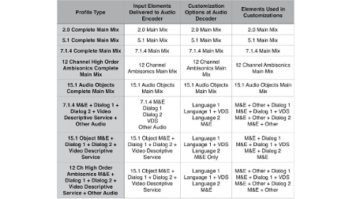The value-added engineer
Feb 1, 2006 12:00 PM, By Kevin McNamara, CNE
It has always been my impression that engineers are some of the most underrated people employed in a station. (To be fair, there are still a handful of owners and managers who appreciate the role occupied by a qualified broadcast engineer, but these are the exception.) This industry-wide attitude has been prevalent for as long as I can remember.

It wasn’t always that way. In radio’s first 30 years, engineers were held in fairly high regard. During that time, TV was beginning to penetrate some of the larger markets; newspapers were radio’s only real competition in respect to news delivery. Radio was busy establishing itself as a reliable and credible medium that could deliver real time news stories and entertainment. It was less focused on the revenue aspects and more toward ensuring that the quality of its on-air product, technical and content, was competitive and the best that they could put forth given their resources and budget. Even in smaller markets, where maybe only one station existed, owners paid attention to the quality of the product. If you ever had the opportunity to dismantle an old facility, you would see evidence of the workmanship � how the wires were bundled carefully with lace, the neatness of the layout and in the documentation prepared (typically full blueprints.)
Engineers were perhaps the larger part of radio’s early success: they designed, built and installed the facilities; they ran the audio boards; they did the production; in some cases, they were the air talent and general manager. As the industry matured, it move toward a different operating model. Radio reached, and was increasingly used, by a large portion of the population, garnering a large share of advertising revenues. New stations appeared and competition for those advertising dollars increased. Now stations, while still realizing the need for a reliable technical product, have shifted their focus to developing the on-air product and creating a superior sales force. It was during this period that I believe the role for an engineer was somehow diminished and relegated to a smaller group of people that worked in the background.
In 2006, those attitudes haven’t changed a lot, which is ironic because the engineer probably plays a much more important part in the station’s operation than ever before. Beyond the traditional responsibilities of maintaining studio and transmitter facilities, engineers are also handling the computers, telephones and data networks, not to mention the occasional request to do carpentry, electrical, plumbing and fixing the station vehicles.
The value you add
Have you ever stopped to think about the added value that you bring to your employer? You may not be required to do all the items listed, but you can be sure that you are doing more than simply maintaining studios and transmitters. I’ve seen recent salary surveys that place broadcast engineers at or below what you might expect at any number of possible careers where you already have a reasonable level of experience. When considered in these terms, it is clear that a competent broadcast engineer brings a tremendous amount of value to a company.
I’m not convinced, with the current breed of the characters managing radio stations, that you would be able to make a case to your employer that you deserve additional money based on your skill-set, because after all, they’re doing you a favor giving you the job in the first place, right?
Identify your skills
Webster’s defines the word “skills” as “proficiency, facility or dexterity that is acquired or developed through training or experience.”
I’ll guarantee that you have developed skills that you may not have realized have added value to a current or future employer. Take a few minutes to think about the following skills you have no doubt developed beyond the obvious (network administrator, circuit designer, facilities manager). These are all marketable skills, though you might want to consider additional education, training and certifications. Here are a few you may not have considered.
Project manager. As an engineering manager or chief engineer, you have probably been involved with building new or upgrading facilities. In that role, were you involved with the initial design, working with outside vendors (architectural, mechanical, contractors) or managing the successful completion of the project? Project managers are required in all industries and tend to be some of the higher paying professions. You should consider the Project Management Profession (PMP) certification from the Project Management Institute (www.pmi.org). It is the globally recognized organization for project management training and certification.
Procurement manager/purchasing agent. You’re probably involved with evaluating, negotiating and purchasing equipment. This is basically the job of a procurement manager. Every company is in the business of purchasing materials and equipment. The Institute for Supply Management (www.ism.ws) offers the Certified Purchasing Manger (CPM) certification, which it claims was the first professional designation for purchasing and supply management.
Project controls analyst. This is also referred to as cost engineering. In the course of planning and working through a project, you are evaluating better, cheaper, faster, stronger, more efficient methods of performing certain tasks, typically resulting in a savings for your employer. This is classic time/value of money analysis. For example, this could be the analysis of necessary resources needed to complete a project vs. the effect time may have on the business or what equipment is necessary to accomplish a certain end. The Association for the Advancement of Cost Engineering (www.aacei.org) offers five certifications in this field.
These are just some of the skills you probably have acquired. I hope this has given you some incentive to more closely evaluate the experience and abilities gained in your present position, and possibly turn them into real added-value strengths that will ensure your future growth.
McNamara is president of Applied Wireless, Cape Coral, FL.









